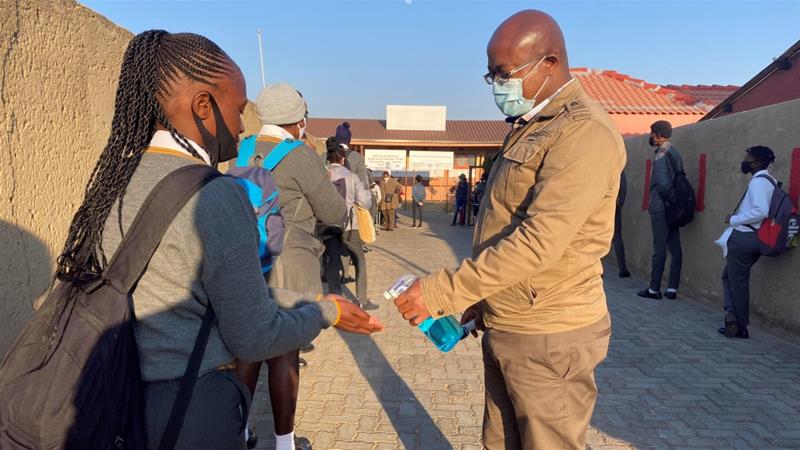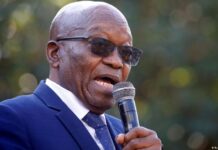The country has recorded over 400,000 coronavirus cases, fifth-highest in the world, and more than 6,000 deaths.
South Africa’s public schools will close again for a month from Monday to limit the spread of the novel coronavirus as the country grapples with surging infections, President Cyril Ramaphosa has said.
The country has now recorded 408,052 coronavirus cases, the fifth-highest in the world, and more than 6,000 people have died from the virus.
Rising infections have caused concern among teaching staff, with unions calling on the government to revoke its decision to reopen schools for certain grades in June.
“Cabinet has decided today that all public schools should take a break for the next four weeks,” Ramaphosa said on Thursday during an address to the nation, adding that the academic year that is due to end in December would be extended.
Schools will be closed from 27 July and are provisionally scheduled to reopen on August 24.
“We have taken a deliberately cautious approach to keep schools closed during a period when the country is expected to experience its greatest increase in infections,” Ramaphosa said.
The president also announced an “historic” 500 billion rand ($30bn) social relief and economic support package to fund the health response and assist “those in greatest need”.
Africa’s most industrialised economy is expected to contract by between 6.3 and 7.5 percent due to the pandemic, according to the African Development Bank.
Excess deaths
Meanwhile, Africa’s top health official said South Africa was seeing a “huge discrepancy” between confirmed COVID-19 deaths and an unusually high number of excess deaths from natural causes, while the coronavirus is spreading there “like wildfire”.
A new report by the South African Medical Research Council, released late on Wednesday, shows more than 17,000 excess deaths from May 6 to July 14 as compared with data from the past two years, while confirmed COVID-19 deaths have surpassed 6,000 [same question as bove regarding this figure].
“The numbers have shown a relentless increase – by the second week of July, there were 59 percent more deaths from natural causes than would have been expected,” the report says.
The council’s president, Glenda Gray, said the excess deaths could be attributed to COVID-19 as well as other widespread diseases such as HIV and tuberculosis while many health resources are redirected towards the pandemic.
Some South Africans are thought to be avoiding healthcare facilities as fears of the new virus spread and public hospitals are overwhelmed.
“The coronavirus storm has indeed arrived,” Ramaphosa said on Thursday.
Health workers
One of the country’s nurses was buried on Thursday, the latest of more than 5,000 infected health workers across South Africa.
Duduzile Margaret Mbonane died just a month before her retirement, her husband said. She was 59. Colleagues dressed in white stood at her outdoor memorial and recited the nurses’ pledge of service.
Some were scared. “As I speak now, most of our colleagues are so infected,” fellow nurse Lindiwe Yeni said. “We looked after people not knowing. We only find that after two or three days.” She wants a rapid test for the virus.
“The government must assist our nurses with protective clothing,” said Duduzile’s husband, Herbert Mbonane. “Maybe my wife wouldn’t have died if personal protective equipment were made available in time.”
Those on the front lines have been hit hard: The World Health Organization said on Thursday more than 10,000 health workers have been infected in its African region, which is largely sub-Saharan Africa.
WHO Africa chief Matshidiso Moeti said she was not able to say how many health workers, the majority of them nurses, have died. She said 41 million items of personal protective equipment are set to begin shipping from China this weekend.













![Hotstar Premium Cookies 2019 [*100% Working & Daily Updated*] Hotstar Premium Cookies 2019 [*100% Working & Daily Updated*]](https://tahav.com/wp-content/uploads/2019/11/Hotstar-Premium-Cookies-Free-100x70.jpg)



